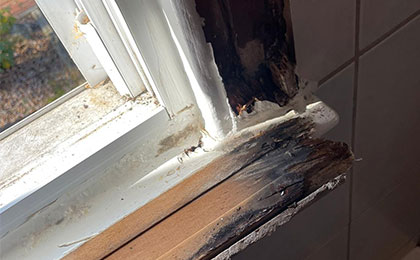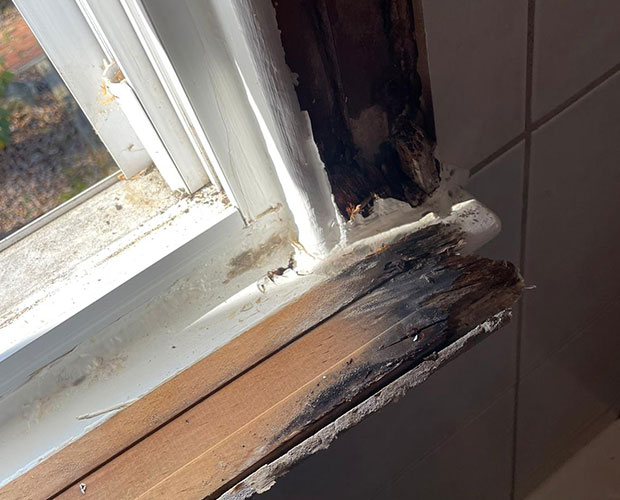
Addressing Mold on Windows
When it comes to getting rid of mold, some parts of your home get more focus than others. We often worry about mold in bathrooms and basements, but we forget about windows. Mold can grow on windows, the sills underneath them, and the frames around them. This mold isn't just bad for your health; it can also damage your home's structure. In this article, we'll talk about why mold grows on windows, the problems it can cause, and how to fix it. It's important to understand this issue, even though many people don't realize how big of a problem it can be.
Understanding Mold on Windows
Mold often grows on windows, especially when it's very damp or there's not enough fresh air. If there's moisture, like from water droplets on windows, and some dirt or dust, mold spores can easily start to grow. It's not just the glass part of the window that can get moldy; the sills underneath and the frames around can also get moldy.
The flat surface of windowsills is a perfect spot for mold because they can collect water from condensation or leaks. Dust and other things that settle on sills give mold the food it needs to grow. If water doesn't drain away well or if the window isn't sealed properly, it can make the moisture problem worse.
The frames of windows can also get moldy, especially in places where water tends to stay, like around the edges or in corners. Some materials used for frames, like wood or vinyl, can soak up water, which mold likes. When condensation forms on the frames, it adds to the moisture, giving mold a good place to grow and spread.
Finding Mold on Windows
If you're trying to spot mold on your windows, take a good look and be ready to tackle any issues you find. Mold often shows up as weird patches or spots that just don't look right compared to the rest of the window. These patches can be black, green, or brown, and they might feel kind of fuzzy or powdery. And hey, if you catch a whiff of a musty smell coming from the window area, that could mean there's mold hanging out.
But it's not just about what you can see or smell. There are other signs too. If the paint or wallpaper near your windows is peeling, especially if it's all wet, that could mean mold is lurking underneath. And if the window frames seem bent or messed up, mold might be the culprit there too.
To really nail down whether there's mold on your windows, you might want to call in the experts from Mold Act. They've got fancy tools like moisture meters and cameras that can suss out mold hiding in places you'd never think to look, like inside walls or around the windows. This checkup helps you figure out how serious the problem is and what you can do about it. Dealing with mold early can save you from bigger headaches down the line and keep your home feeling fresh and healthy.
Why Mold Grows on Windows
Mold on windows happens for different reasons. One main cause is when there isn't enough air moving around. This makes moisture stick around and lets mold spores grow. Places like bathrooms or kitchens, where it's often damp and steamy, are especially prone to this.
When windows have leaks or aren't sealed properly, water can sneak in when it rains or snows. This makes things wet and perfect for mold to thrive. If the caulking around the windows is cracked or the seals are damaged, moisture can seep in, giving mold a good place to live. Plus, if the insulation around windows isn't good, it can create condensation, which makes the mold problem worse.
Sometimes, things we do every day can also encourage mold growth on windows. For instance, cooking without using vents or drying wet clothes inside adds moisture to the air. And if we don't clean window sills often or replace old weather stripping, mold can keep growing without us even realizing.
To stop mold on windows, we need to fix the things that are causing it. This means finding and fixing leaks, making sure there's enough air moving around, and doing regular maintenance like cleaning and replacing old parts. By taking these steps, we can prevent mold from growing and keep our homes healthy.
The Dangers of Mold on Windows
Having mold on windows might not seem like a big deal, but it's actually pretty risky. It's not just about how it looks-it can harm your health. When you disturb mold, like when you clean or move things, tiny bits of mold can float in the air and go into your lungs. This can cause a lot of problems.
If you have allergies, mold can make your symptoms worse. You might sneeze a lot, cough, or feel stuffy in your nose. For people with asthma, mold can even cause serious attacks. Breathing in mold can also give you respiratory infections because those tiny bits can go deep into your lungs and mess with your body's ability to fight off sickness.
But breathing in mold isn't the only danger. Some molds make toxins that can affect your whole body. They can give you headaches, make you dizzy, or even mess with your ability to think clearly. If you're around these toxins for a long time, they can weaken your immune system, making it easier for you to get sick from other things.
Mold on windows can cause health problems and damage your home's structure. It can harm the wood in your window frames, making them weak and possibly causing them to break or rot. This isn't just ugly-it can be dangerous, especially if the windows are on upper floors. Also, the moisture from the mold can spread and damage other parts of your home, like the walls and ceilings.
Dealing with mold on windows is really important for keeping yourself healthy and your home safe. Acting quickly and doing things to stop mold from coming back are really important to make sure your home stays safe and healthy.
Effective Solutions for Mold Removal and Treatment
When you're dealing with mold on windows, it's often best to get professional help to make sure it's taken care of properly and doesn't come back. Mold Act specializes in getting rid of mold and treating it, using advanced methods and eco-friendly products to make your home safe and healthy again. Our team of experts will thoroughly check the affected area, figure out why the mold is growing, and then use the right techniques to get rid of it for good.
Our Services
At Mold Act, we know how important it is to deal with mold problems quickly and effectively. With more than twenty years of experience, we've become experts in getting rid of mold for our clients. We offer a range of services, from checking for mold and testing it to getting rid of it and stopping it from coming back. Our trained technicians follow the best practices in the industry and use the latest equipment to make sure the mold is completely removed, leaving your home clean and safe.
Addressing Mold on Windows With Mold Act Professional Services
Dealing with mold on windows is a serious issue that needs immediate attention and proactive action. Mold growth on windowsills and frames not only ruins the appearance of your home but also brings health risks and structural problems. Recognizing the causes and signs of mold on windows is crucial for homeowners to tackle the issue effectively.
You need professional help to get rid of mold properly and make sure it doesn't come back. That's where the Mold Act comes in. We are the experts in removing mold and treating it, using special methods and eco-friendly products to make sure your home is safe and healthy again. With more than twenty years of experience, Mold Act offers different services like checking for mold, testing it, getting rid of it, and stopping it from coming back.



Mold Remediation Services

